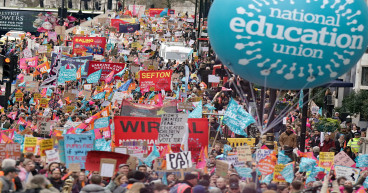MSFT 408.77 -5.4933% AAPL 227.085 -1.3103% NVDA 132.5201 -4.891% GOOGL 171.3 -1.8113% GOOG 172.8692 -1.8569% AMZN 185.36 -3.824% META 564.34 -4.6401% AVGO 168.15 -4.8064% TSLA 249.66 -3.0635% TSM 189.54 -2.5401% LLY 839.61 -0.8526% V 289.94 -0.0758% JPM 222.65 -0.7843% UNH 567.9925 0.8939% NVO 111.63 -1.4218% WMT 82.03 0.7863% LVMUY 132.48 -1.1269% XOM 117.11 0.3599% LVMHF 664.31 -1.3484% MA 501.1476 -2.4416%
General news
Teachers who help exam pupils for part of strike day should be fully paid – NEU

Image Source: PAMEDIA
Teachers who agree to attend school on strike days to help students preparing for exams should leave once the supervision is over and be paid in full, guidance from the National Education Union suggests.
Fresh strikes by teacher members of the NEU in England are set to go ahead this summer term amid a dispute over pay.
The union has issued dispensation guidance to its members, reps and officers ahead of the planned walkouts on April 27 and May 2 to “minimise disruption to Year 11 and 13 exam preparation”.
The NEU said it recognises that it is “appropriate to seek agreements with headteachers” that permit exam year students to attend school on strike days “for revision activities or exam practice”, and it will support arrangements that provide “the minimum level of teaching staff needed” for these to take place.
If arrangements are agreed between NEU reps and headteachers, the union would request their members “participate where needed but they cannot be compelled”, according to the guidance.
It says: “If, in extremis and only by prior agreement with the NEU, members are asked to attend school for part of the day to supervise a specific exam group, then they should attend for this purpose only and leave work afterwards.”
The guidance adds: “Agreement should be sought from the headteacher that no pay is to be docked even if the member has not worked the full day.”
If members are paid for strike days because they are helping supervise exam students in school then the NEU said they would “encourage” them to donate to the union’s hardship fund to support striking teachers.
The union is planning five days of teacher walkouts in the summer term after members overwhelmingly voted to turn down the Government’s pay offer.
The Government offered teachers a £1,000 one-off payment for the current school year (2022/23) and an average 4.5% pay rise for staff next year.
The latest guidance from the NEU says: “Only the Government, by coming back to the negotiating table with a much-improved offer, can eliminate that disruption altogether and avert these upcoming strikes.”
It adds: “Should employers attempt to impose arrangements that are not agreed by NEU reps and members in a school, the NEU retains the right to remove this dispensation guidance for exam year group provision.
“In any case, if no agreement can be found, the default position is that members cannot be obliged to make any dispensation arrangements for Year 11 and Year 13 provision.”
Four education unions – including the NASUWT teaching union, the National Association of Head Teachers (NAHT) and the Association of School and College Leaders (ASCL) – have rejected the pay offer.
Last month, Education Secretary Gillian Keegan suggested teachers could miss out on an increased pay deal this year if they turned down the offer.
She said teachers’ pay will be decided by the independent pay review body.
Geoff Barton, general secretary of the ASCL, said: “We are supportive of this guidance from the NEU as a sensible measure which preserves the right to strike while seeking to ensure that there is provision for students who will shortly be taking exams.
“The details of local arrangements, including the question of pay, are a matter for agreement between employers and NEU reps and officials.
“We agree with the NEU that only the Government can eliminate disruption altogether by coming back to the negotiating table with a much-improved pay offer.
“This must happen in order to address pay erosion and teacher shortages, and it must be fully funded. So far, the Government has not made any attempt to reopen negotiations.”